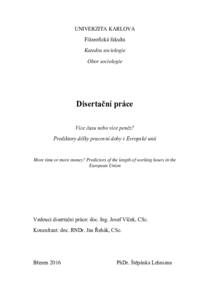Více času nebo více peněz? Prediktory délky pracovní doby v Evropské unii
More time or more money? Predictors of the length of working hours in the European Union
dissertation thesis (DEFENDED)

View/
Permanent link
http://hdl.handle.net/20.500.11956/83823Identifiers
Study Information System: 103846
Collections
- Kvalifikační práce [23976]
Author
Advisor
Consultant
Řehák, Jan
Referee
Havlík, Radomír
Kuchař, Pavel
Faculty / Institute
Faculty of Arts
Discipline
Sociology
Department
Department of Sociology
Date of defense
24. 6. 2016
Publisher
Univerzita Karlova, Filozofická fakultaLanguage
Czech
Grade
Pass
Keywords (Czech)
pracovní doba, délka pracovní doby, Evropská unie, prediktory, kontextuální úroveňKeywords (English)
working time, length of working hours, European Union, predictors, contextual levelŠtěpánka Lehmann: Více času nebo více peněz? Prediktory délky pracovní doby v Evropské unii Disertační práce Abstrakt Předkládaná empirická práce analyzuje důležité prediktory délky pracovní doby, přičemž si klade za cíl zastřešit dosavadní koncepce přístupem, jenž by umožňoval integrovat poznatky o působení faktorů délky pracovní doby na různých úrovních do jednotného komplexního modelu. Využívá k tomu exploračních analytických metod aplikovaných na data z Evropského šetření pracovních podmínek (EWCS). Práce vychází ze dvou předpokladů. Zaprvé že délku pracovní doby je vhodné studovat na základě její distribuce spíše než na základě údajů o průměrné délce pracovní doby, a zadruhé že rozhodování o pracovní době probíhá simultánně na čtyřech úrovních, jejichž mechanismy je potřeba pochopit: na úrovni národně- specifické, odvětvově-profesní, úrovni pracoviště a úrovni domácností. Provedené analýzy odhalily nejdůležitější prediktory délky pracovní doby a ukázaly jejich vzájemnou provázanost. Integrací prediktorů působících na jednotlivých úrovních byl sestaven model zohledňující při analýze vzorců délky pracovní doby identifikované relevantní faktory. Komplexita problematiky pracovní doby, jež je z prezentovaných výsledků zřejmá, problematizuje možnosti jednotné evropské regulace délky pracovní doby. Klíčová...
Štěpánka Lehmann: More time or more money? Predictors of the length of working hours in the European Union Dissertation thesis Abstract Present empirical study analyses important predictors of the length of working hours. It aims at integrating existing conceptions via an approach that would synthetize findings on the influence of different factors of the length of working hours at various levels into a consistent and complex model. For these purposes it uses explorative analytical methods applied on data from the European Working Conditions Survey (EWCS). The thesis is based on two assumptions. First, it is more appropriate to study the length of working hours on the basis of its distribution than based on the average number of working hours. Second, the specific working hours are being established simultaneously at four different levels, the mechanisms of which need to be understood: at the national, sectoral and professional, establishment and household levels. The analysis performed revealed the most important predictors of the length of working hours and their mutual ties. The integration of predictors that are effective at the individual levels resulted in a model which reflects the identified relevant factors when analysing patterns of the length of working hours. The complexity of the working time...
